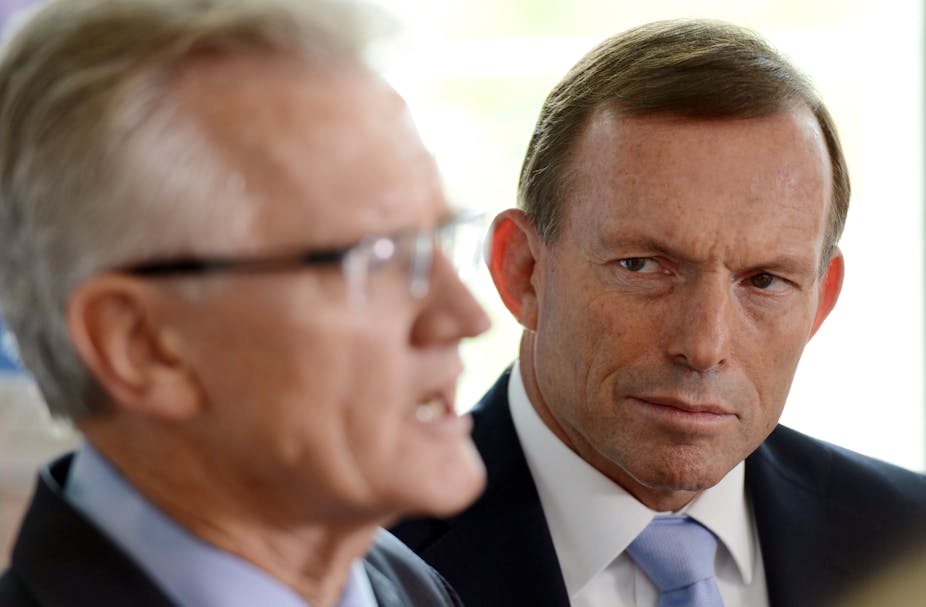A former colleague of Tony Abbott says John Howard would never have flatly denied SPC Ardmona the $25 million in assistance. “He’d have given $15 million with conditions,” said the man, who was praising not criticising the present Prime Minister’s backbone.
The Liberal dries and business are giving Abbott general ticks. He’s had more trouble with the “retail” politics, where difficult issues, his own over-reach and the public’s entrenched lack of warmth towards him have dogged his days.
With “trust” an electoral trigger point, it’s unhelpful to have one of your backbenchers call you a liar. In the usual playbook, that’s what they’re supposed to call your opponent.
But Abbott has handled with kid gloves Sharman Stone who, in multiple attacks, has accused him of making workers’ conditions the scapegoat for the problems of SPC Ardmona, which is in her Murray electorate.
Campaigning for the Griffith byelection on Thursday Abbott – who in opposition was paranoid about division – said: “you have got to extend a certain licence to a disappointed local member”. He expected his MPs to be “human beings first”, champions for their electorates second, and “then you’ve got to be a team player”. Grasping for some positive angle, he said it was “about time to have some real human beings in the parliament” - rather than “identikit union lawyers [Labor’s Terri Butler] or former union officials” - and Liberal candidate Bill Glasson “certainly qualifies on that count”. The last thing voters would get from Glasson was “a mindless parroting of the party line”.
Saturday’s Griffith test is more important for opposition leader Bill Shorten but it is a marker for Abbott too.
A Labor loss in a seat it holds and where Shorten has extensively campaigned, against the background of some Abbott government fumbles, would be a major setback in his early days of leadership, however much the result was a personal vote for a popular Liberal candidate. Provided the Liberals did not go seriously backwards – which would be a negative commentary on the government and might create backbench jitters – Abbott could rationalise a Labor win by saying no more juice could be extracted from what was a Labor seat.
After having some worries a couple of weeks ago, Labor by Thursday was feeling more relaxed about Griffith, which is on a 3% margin. On the basis of its polling, it believed the result was heading towards where it was at the September election. Liberal sources were predicting a “comfortable” ALP victory.
One of the unknowns, particularly important for Labor, is what the voter turnout will be; Shorten on Thursday was urging people to vote.
Shorten’s campaigning was complicated by having to deal with the call by Australian Workers’ Union national secretary Paul Howes (Shorten’s successor in the position) for a business-union-government “grand compact” to deliver more harmonious industrial relations, rather than the “blood sport” we have. Howes’s contentions that Abbott is more politician than ideologue and that the government is not un-turnable on industrial relations were inconvenient propositions for Shorten, who constantly asserts the opposite.
Knocking consensus is like attacking motherhood. But the slightest countenancing of the notion that Abbott could be flexible on IR would undercut everything Labor has been saying.
Howes’ blueprint might be unrealistic but attacking it is a tricky exercise for Shorten. He tried to dismiss it while not appearing to favour divisiveness.
“I think it’s great to have consensus in workplace relations – it’s what I’ve done for 25 years. But I’m just not going to engage in going to some fantasy that Tony Abbott’s going to change his spots.”
The political battle will ramp up next week when parliament holds its first sitting of 2014, with Saturday’s Griffith result affecting the atmospherics. Behind the scenes, by Friday Treasurer Joe Hockey will receive the report from the Commission of Audit that will provide the grist for the May budget’s cuts.
Hockey said this week the government hoped to adopt the “great majority” of its recommendations. He also wants to release the findings sooner rather than later, as part of the trying to get community ownership for what are going to be politically unpalatable measures.
The Treasurer is a man on a mission, marching boldly behind a banner which brought him flack when he first raised it in opposition. “The age of entitlement is over,” is his much repeated message.“The age of personal responsibility has begun.” And it’s “heavy lifting” all round, apart from the most vulnerable. Put more bluntly, though not in his words, inflict the pain (and take a good deal too) to get the gain.
Speaking at the Lowy Institute on Thursday Hockey said: “Too many taxpayers’ dollars have been spent on corporate and middle class welfare and too often previous governments have been drawn into areas that are better left to the private sector. Not only are these policies an unsustainable use of taxpayers funds, they also undermine economic incentives, our productivity and ultimately our national prosperity.”
Earlier in the week he told the Australian Financial Review that the community “needs to be aware of why we are going down the path of change. It’s not properly understood at the moment”.
Apart from the Griffith result, next week’s expected Newspoll will gauge the government’s progress in getting its message through to the public, while the Coalition parties’ meeting, where backbenchers have said the SPC Ardmona decision will be raised, will indicate how it is travelling internally.

